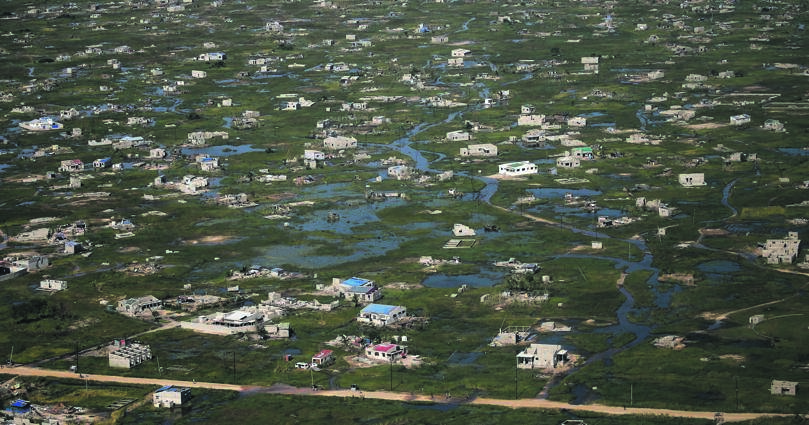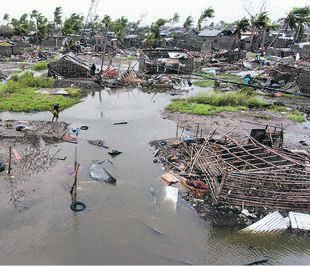
The destruction wrought by Cyclone Idai in southern Africa this month shows that weather warnings must spur action, and infrastructure has to be built with climate risks in mind, if people are to be kept safe on a warming planet, say researchers and officials.
The death toll from the powerful storm, packing high winds which barrelled inland, has risen above 700 across Mozambique, Malawi and Zimbabwe, with floods caused by the weather system affecting nearly 3 million people.
The region may also have lost infrastructure worth more than $1 billion in the disaster, including damage to the Mozambican port of Beira, the coastal city where the cyclone came ashore, according to the UN Economic Commission for Africa.
Mami Mizutori, head of the UN Office for Disaster Risk Reduction, said the devastation in and around Beira – where vast areas were flooded – was “a clear demonstration” of climate change, adding to a pre-existing cocktail of risk rooted in poverty, unplanned urbanisation, environmental degradation and weak ability to prepare.
“It is particularly distressing that severe damage has been done to schools, hospitals, health facilities and other key infrastructure as this will have serious consequences for the long-term efforts of these countries to eradicate poverty and hunger,” she said in emailed comments.
Scientists are still exploring if and how global warming may have increased the rainfall and storm surge brought by the cyclone, but they have made general observations about how climate change could have worsened the situation.
Erin Coughlan de Perez, manager of the climate science team at the Red Cross Red Crescent Climate Centre, said climate change had increased average sea levels in the region – meaning that it very likely boosted Idai’s storm surge, which hit informal settlements in low-lying parts of the city.
And, in many cases, warmer ocean temperatures fuel more intense rainfall in storms like Idai, with the large amount of rain dumped inland in Malawi, Mozambique and Zimbabwe responsible for many deaths and an enormous loss of infrastructure.
Coughlan de Perez and other researchers said forecasts for Cyclone Idai had been accurate and well disseminated.
What was missing was a detailed understanding of how different areas would be affected, and a joined-up plan to act on the information, they said.
Douglas Parker, professor of meteorology at the University of Leeds, said getting government departments to coordinate their response – something Britain has done to manage flooding emergencies better in recent years – was a tough task.
“Every country in the world faces these challenges. But in countries where the communications or governance of things are not as advanced as they might be ... then it can be a greater challenge,” he told the Thomson Reuters Foundation.
In Africa, weather extremes tend to be more severe, such as heavier rainfall and fiercer droughts, and people are more vulnerable “so the effects of a breakdown in communication or a lack of action are much more dramatic”, he added.
LONG-TERM INVESTMENT
Mozambique’s government began to put in place emergency staff and supplies ahead of Cyclone Idai’s arrival, although earlier flooding in the same areas hampered preparations, according to the US government development agency, USAID.
Mozambique’s National Institute of Disaster Management, estimating that 600 000 people could be affected by the storm, also coordinated evacuations of those in its path, and distributed alerts and updates to communities via mobile phones, USAID said.
In addition, efforts by local Red Cross volunteers to warn people and get them to seek shelter did help save lives, said Coughlan de Perez – but there was a limit to what could be achieved at relatively short notice.
“You cannot do everything five days before a storm,” Coughlan de Perez said.
“This needs to be coupled with long-term investments – in climate change adaptation and in good development.”
The UN’s Mizutori said that while governments around the world must reduce their greenhouse gas emissions to limit temperature rise, there should be “equal emphasis” on investing in stronger infrastructure for poorer countries that lack the resources to adapt to more extreme weather and rising seas.
“Much more needs to be done in this regard or it will be extremely difficult to achieve the Sustainable Development Goals, many of which depend on a reduction in disaster losses,” she added, referring to global targets that include ending poverty and hunger by 2030.
Coughlan de Perez said that when the time came to start rebuilding homes, schools, clinics, roads and other facilities destroyed by Cyclone Idai, factoring in the rising risks of wilder weather would be key.
“I do hope people will be looking at long-term trends as well – not just building back for yesterday's climate, but building back for today’s climate and tomorrow's climate,” she said.
While she expected aid agencies, authorities and others to have good intentions in that regard, whether there would be enough funding and political momentum to ensure a climate-safe recovery was unclear.
“I think that is where we need to hold ourselves accountable,” she added.
LESSONS UNHEEDED?
Rui Carlos da Maia, director of the disaster risk management unit at the Technical University of Mozambique (UDM), said he feared his country would be slow to learn the lessons of the disaster.
Politicians were poorly educated on the threat that climate change poses, while the government lacked the money, equipment, human resources – and will – to build back better, he told the Thomson Reuters Foundation from Maputo.
The city of Beira should never have been constructed in such a flat, flood-prone area, Da Maia said, but “from previous experience, they will rebuild in the same places”.
Schools and hospitals were unlikely to be made safer as construction contracts often go to the lowest bidder and building codes were not respected, he noted.
In general, understanding the risks accompanying climate change, and how to address them, was low in Mozambique, he said.
“We have to help African governments embed climate change into public policy,” he added. – Megan Rowling, Thomson Reuters Foundation




 Publications
Publications
 Partners
Partners










